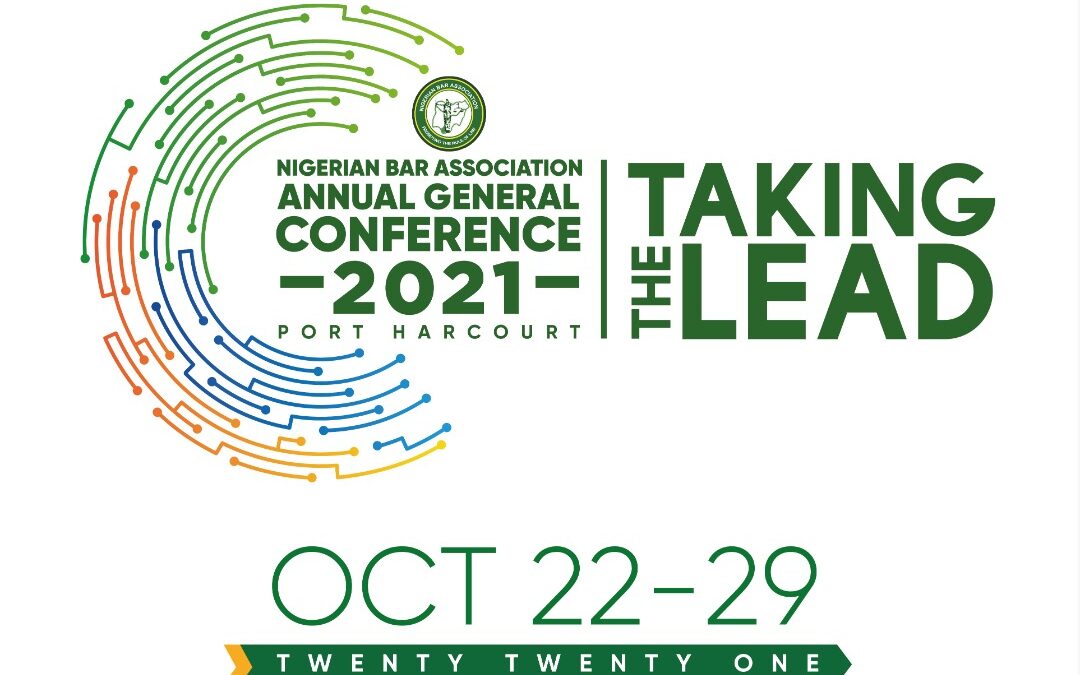
by Legalnaija | Oct 20, 2021 | Uncategorized

Come the 25th of October, 2021, the aforementioned topic is going to be the discuss at the first plenary session of the NBA Conference, and this conversation could not have come at a better time. To become an effective Nation, there are some attributes in which we must imbibe, one of which is for every Nigerian to take leadership in whatever sphere they find themselves and channel the collective energy into nation building.
To achieve such, both Leaders and followers must have a clear vision of the collective goal if there has to be any success. This principle can also be applied to several areas of business and personal life in Nigeria. It is also interesting to note that some of our best and brightest in the world including world leaders, government officials, civil society and honourable members of the bar, will be on hand to engage and strengthen our collective efforts in seeing continuous and sustainable economic and political development in Nigeria.
As put by the President of the Nigerian Bar Association, Mr. Olumide Apkata, “The 61st edition of the conference represents a novel platform for knowledge exchange on the continent as we bring together world leaders, political icons, judges, leading lawyers, thought leaders, policy makers, business icons, and civil society to not just discuss but produce an implementation plan to foster the adoption of policies, standards and practices leading to socio-political stability, economic growth, sustainable and infrastructural development for accelerated regional and economic integration”.
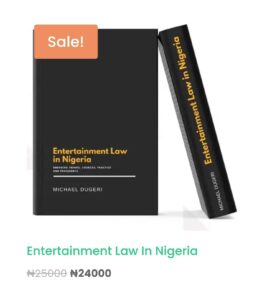
ORDER NOW
Also in the TCCP Chairman’s address, Mr. Omubo Victor Frank – Briggs shared that “This special conference is about telling our story through thought leadership, and it is on this basis that I welcome you and ask that you immerse yourself in the celebration of 61 years of the NBA Annual General Conferences, 61 years of Nigeria’s nationhood, and 61 years of independence of a good number of African countries. This becomes important in this age that #BlackLivesMatter, and it is on that score that I ask that you prioritize TAKING THE LEAD in becoming brilliance; in taking hold of the future of work; and contributing, through this conference, to shaping the work of the future. Work which will sound in bits and not atoms – that is: work that speaks in the currency of data and not fossil fuels. The aim is to heal all that tends to divide us, to bring light into the darkness that pervades us, and reclaim the rule of law that we seem to evade.”
Lawyers attending the Hybrid Conference either in person or online are encouraged to attend and participate in this session.
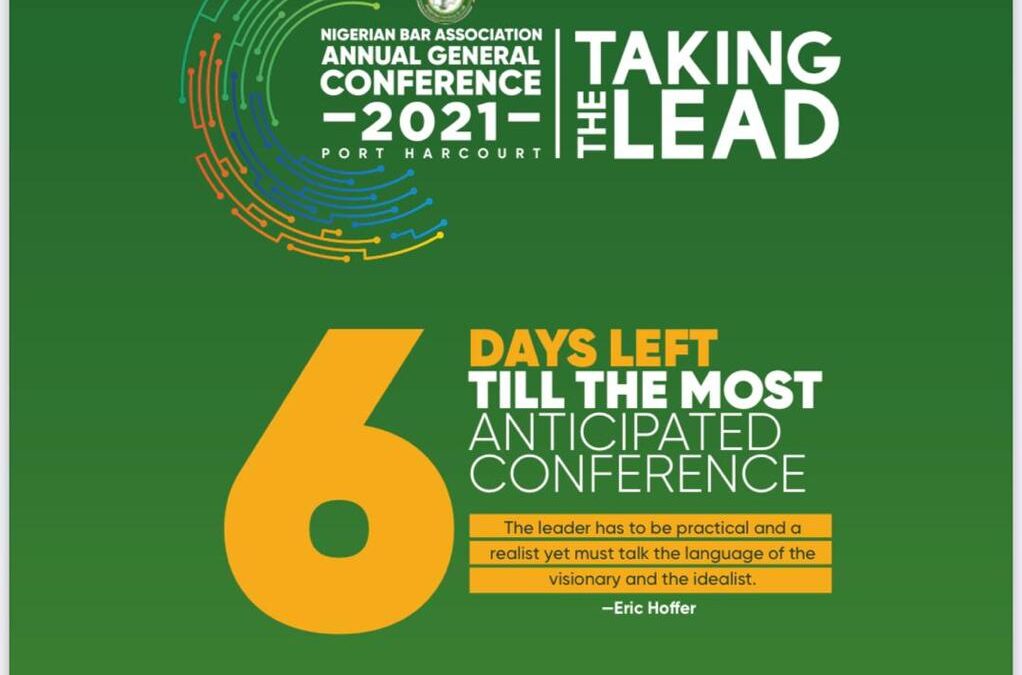
by Legalnaija | Oct 16, 2021 | Uncategorized

The 61st edition of the Nigerian Bar Association’s Annual General Conference is 6 days away and we are very excited. According to the NBA President, Olumide Akpata “it represents a novel platform for knowledge exchange on the continent as we bring together world leaders, political icons, judges, leading lawyers, thought leaders, policy makers, business icons, and civil society to not just discuss but produce an implementation plan to foster the adoption of policies, standards and practices leading to socio-political stability, economic growth, sustainable and infrastructural development for accelerated regional and economic integration”

The conference will run from 22nd October to 30th October with the theme: Taking the Lead. According to the TCCP Chairman, “t<span;>his special conference is about telling our story through thought leadership, and it is on this basis that he welcomes you and asks that you immerse yourself in the celebration of 61 years of the NBA Annual General Conferences, 61 years of Nigeria’s nationhood, and 61 years of independence of a good number of African countries.”
Most definitely the conference will be one of many firsts.
Legalnaija

by Legalnaija | Oct 9, 2021 | Uncategorized
The Supreme Court of Nigeria has several opportunities to emphasize the importance of the rule of law to nationhood. The fundamental principle behind the rule of law was captured by the Noble Lord Oputa JSC in the locus case of Gov. of Lagos State v Ojukwu (1986) (pt 18) 621 where he noted thus:
“The rule of law presupposes that the state is subject to the law, that the judiciary is a necessary agency of the rule of law, that the Government should respect the right of individual citizens under the rule of law and that to the judiciary, is assigned both by the rule of law and by our constitution the determination of all actions and proceedings relating to matters in disputes between persons, Governments or authority.”
The rule of law has suffered different forms of abuse over the years in Nigeria both under military and civilian rule. Whilst the Nigerian military administration was characterized by textbook despotism, democratic rule has also seen its fair share of the abuse of the rule of law. As A.V. Dicey postulated, the rule of law in modern contemporary jurisprudence is described as “the condition in which all members of the society including the rulers and the led accept the authority of the law.”[1]
Hence, a simple disobedience to the authority of the law is a violation of the rule of law. There is no gainsaying that even the rulers and makers of the law can fall victim to the crime of disobedience to lawful authority. Such was the case in Ibrahim Umar & Ors v APC (2018) NWLR (Pt. 1650) 139 where the Supreme Court was invited to uphold the fundamental doctrine of the rule of law after a Nigerian political party had attempted to rape the blindfolded Lady Justice after stealing her impartial scales. However, the radical and Noble Lord Chima Centus Nweze JSC of the Supreme Court who was entreated with the responsibility of writing the lead decision of the Apex Court was on deck to checkmate this wanton disrespect for the rule of law and abuse of the judicial system.
In that case, the Appellants had approached the High Court of Rivers State (trial Court) as Claimants, entreating that Court to grant them reliefs declaring them entitled to participate in the APC Ward Congress in Rivers State, having satisfied the requirements to participate. They also sought, inter alia, to nullify the Ward elections earlier conducted by Respondents (APC), as well as perpetual orders restraining the Respondents from acting on the Ward elections so erroneously conducted.
The trial Court granted the Appellants’ reliefs after the Respondent vide its Counsel had revealed that it was not opposing same. On the day slated for delivery of the ruling by the trial court, sponsored hoodlums and miscreants had invaded the Court premises and engaged in a wanton spree of destruction of court properties and laid siege thereto for several hours with the aim of intimidating the machinery of the rule of law. The trial Court was still able deliver it’s Ruling on that day despite this brazen display of judicial intimidation. It issued an interlocutory order restraining the Respondents from conducting the party’s congress.
However, just barely twenty-four hours later, the Respondents (APC) in a most obstinate display of judicial impertinence, purported to conduct another congress, in acute disobedience to the pending court order. It was not until after the Respondents (who were interestingly the ruling party at the federal government at that time) had successfully completed their contumacious display of disobedience of the order of the High Court by concluding an unlawful congress, that they approached the Court of Appeal in a most impudent manner, seeking an order of stay of proceedings of the trial Court and a stay of execution of the injunctive orders which they had already flagrantly disobeyed. The Learned Justices of the Court of Appeal interestingly granted the prayers of the Respondents (Appellants at the Court of Appeal) without regards to the plethora of authorities on the need for fealty to the rule of law which was brought to their notice by the Appellants (Respondents at the lower court) wherein the Apex Court had severally held that one who is disobedience of a pending order of the court cannot be granted a stay by an appellate court. It was against this opprobrious decision of the Court of Appeal granting the stay of proceedings and execution that the Appellants approached the Supreme Court as their last resort to uphold the rule of law.
The Supreme Court in its lead judgment delivered by the Noble Lord Nweze JSC took its time to elucidate on the need for all persons and authorities to show respect for constituted authority (including the judiciary). The erudite Justice of the Supreme Court held as follows:
“From the facts of this appeal, it is not in doubt that, while the Respondent was in grave disobedience of two Orders of the trial court, it approached the lower court for the discretionary orders of stay of proceedings and stay of execution. Nothing could be more impetuous than that! The Respondent’s approach reminds me of the insightful observation of Eso JSC in Military Gov of Lagos State & Ors v Ojukwu & Ors (1986) LPELR 3186- (SC). According to his Lordship:
“I think it is a very serious matter for anyone to flout a positive order of a court and proceed to taunt the court further by seeking a remedy in a higher court while in contempt of the lower court…””
Justice Nweze also disparaged the invasion of the trial Court by hoodlums who were seeking to subvert the course of justice, and commended the trial judge for not succumbing to this attack on the independence of the judiciary. Justice Nweze went on to berate the learned justices at the Court of Appeal for refusing to follow the due process of the law by upholding the inveterate doctrine of stare decisis, which he termed “a doctrine of illustrious jurisprudential pedigree.” In his words:
“With respect, learned senior counsel’s (for the Respondent’s) feeble attempt to defend the lower Court’s inelegant effort to distinguish the cases of Military Governor of Lagos State v Ojukwu (supra) and Odogwu v Odogwu (supra) from the appeal before it flies in the face of the vigour and cogency of these authorities to the proceedings of that Court. Indeed, nothing could be a more sacrilegious exercise of discretion than the lower Court’s ill-advised embarkation on its ill-fated journey of self-immolation or what the Japanese call hara-kiri, that is, suicide, all in attempt to circumvent the authority of this court.”
Justice Nweze thus upheld the age-long doctrine of stare decisis as he refused to approve the Court of Appeal’s brazen attempt at judicial rascality. He laid reliance on the cases of Dalhatu v Turaki (2003) 15 NWLR (pt 843) 310, 350; Osakwe v Federal College of Education, Asaba (2010) 10 NWLR (pr.1201) 1, 35-36; and Atolagbe & Anor v Anwuni & Ors (1997) 8 NWLR (pt. 522) 536, 567.
Justice Nweze also commented on the independence of the judiciary as he quoted a paragraph from Odogwu v Odogwu (Supra) where Karibi-Whyte JSC opined as follows:
“The court guards its powers and image jealously. It should therefore be extremely wary in the manner it exposes such image, the diminution of its powers and the enforcement of its authority to public ridicule.”
My Lord then went on to further condemn the Court of Appeal for condoning the egregious, contumacious, and censorious approach of the Respondents, and stated that the courts have a duty to resist an attempt to achieve forensic victory through jiggery pokery. He then went on to allow the appeal and set aside the Ruling of the lower Court.
The distinguished Justice also used this opportunity to advice Legal Practitioners to desist from ungainly acts which can subterfuge the rule of law and the independence of the judiciary. In doing so, he imposed a direct duty on Lawyers to flee from lending any support to violations to the rule of law. He held as follows:
“My Lords, kindly bear with me. Before concluding this judgment, I want to express my reservations about the advocacy style of the Respondent’s counsel in this appeal. Counsel, even if they are partisan politicians, should learn to draw a line between the modus operandi of politicians and the attitude of the courts of law to issues verging on trickery. If politicians gain electoral victory by false pretences, a court of law, nay more, the court of equity must be spared the contempt of being employed as an instrument of advancing electoral fraud!”
Legal Practitioners should therefore be mindful of this duty in the discharge of their contractual duty to their clients. Lawyers have a duty to uphold and defend the Constitution and the rule of law at all times. The Rules of Professional Conduct for Legal Practitioners also imposes a direct duty on lawyers to withdraw their representation whenever their clients insist on charting an immoral or unjust cause in the conduct of their case.
As an aside, this writer has noticed that some lawyers are under the erroneous impression that some provisions of the RPC which imposes superior ethical standards for lawyers exists just for the purpose of passing bar finals. However, this is not so. The rules are not for fun and are not to be discarded after successfully scaling through the bar finals. They are meant to guide the conduct of counsel at all times, no matter how archaic or how much its provisions may be in need of amendment.
Hopefully, the invocations of the Supreme Court vide the Noble Lord Nweze JSC in Umar & Ors v APC (Supra) as well as the earlier decisions of the Court will not fall on deaf ears.
Nonso Anyasi can be reached via nonsoanyasi@nigerianbar.ng
[1] Prof A. V. Dicey: Introduction to the Study of Law of the Constitution 10th Edition Macmillan Education Ltd, 1959 @ p. 202
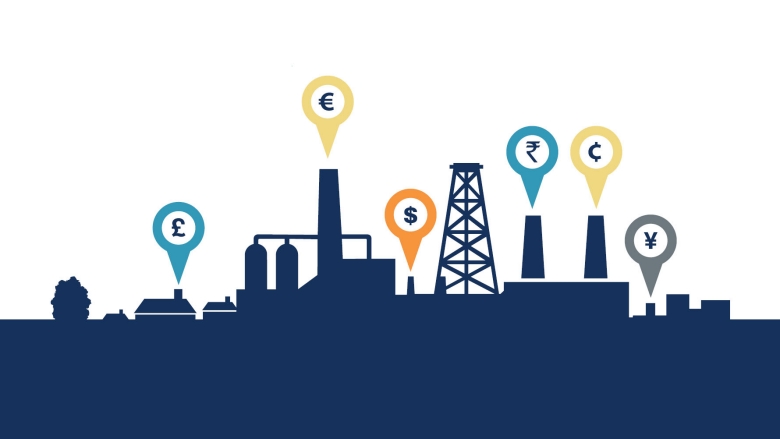
by Legalnaija | Sep 21, 2021 | Uncategorized
Human beings have always sought for ways to make life easier and more enjoyable. Therefore, man in his intelligence decided to take advantage of the natural resources provided by nature, to ensure survival. Exploration of Oil and Gas, Farming and Agriculture are all human activities geared towards economic stimulation and survival. However, these activities originally discovered to help man, have unfortunately become both ‘a blessing and a curse’. This is because these human activities have led to serious environmental degradation such as global warming. Thus, according to the Natural Resources Defense Council (NRDC), “Since the Industrial Revolution, the global annual temperature has increased in total by a little more than 1 degree Celsius, or about 2 degrees Fahrenheit. Between 1880—the year that accurate record keeping began—and 1980, it rose on average by 0.07 degrees Celsius (0.13 degrees Fahrenheit) every 10 years. Since 1981, however, the rate of increase has more than doubled: For the last 40 years, we’ve seen the global annual temperature rise by 0.18 degrees Celsius, or 0.32 degrees Fahrenheit, per decade”[1].
This is a clear revelation of how industrialization and other human activities have quickened the rate at which the Globe warms. Today, Global warming has become a source of concern, as the catastrophic increase in the earth’s temperature and its concomitant effects, are threatening human existence on earth.
We shall therefore briefly consider Global Warming, the causes of Global warming and its effect. We shall also consider carbon pricing and its role in mitigating or curbing global warming.
According to the National Aeronautics and Space Administration (NASA), Global warming is the long-term heating of earth’s climate system observed since the pre-industrial period (between 1850 and 1900) due to human activities, primarily fossil fuel burning, which increases heat-trapping greenhouse gas levels in Earth’s atmosphere[2]. It therefore goes without saying, that the various human activities that increase concentration of Greenhouse gases (GHG) in the atmosphere, are primarily responsible for global warming
Greenhouse gas is defined as any gas that has the property of absorbing infrared radiation (net heat energy) emitted from Earth’s surface and reradiating it back to Earth’s surface, thus contributing to the greenhouse effect.[3] In simpler terms, GHG are gases that trap heat in the atmosphere.[4] These gases are called greenhouse gases because they absorb heat in the atmosphere, which causes the greenhouse effect. By trapping heat in the atmosphere, the greenhouse gases help to keep the earth warmer than it would otherwise be, allowing life on earth to exist.
While the greenhouse effect sustains warmth on earth to enable life on earth exist, the enhanced greenhouse effect is on the other hand, harmful to life on earth. The enhanced greenhouse effect, otherwise called global warming, is caused by human activities which increase concentration of greenhouse gases in the atmosphere, thereby making the earth warmer than it ordinarily should be. The stages of enhanced greenhouse effect are illustrated below[5]:
Step 1: Solar radiation reaches the Earth’s atmosphere – some of this is reflected back into space.
Step 2: The rest of the sun’s energy is absorbed by the land and the oceans, heating the Earth.
Step 3: Heat radiates from Earth towards space.
Step 4: Some of this heat is trapped by greenhouse gases in the atmosphere, keeping the Earth warm enough to sustain life.
Step 5: Human activities such as burning fossil fuels, agriculture and land clearing are increasing the amount of greenhouse gases released into the atmosphere.
Step 6: This is trapping extra heat, and causing the Earth’s temperature to rise.

Steps 1 -4 above reflect the greenhouse effect, while steps 5 & 6 reflect enhanced greenhouse effect. The problem therefore, is the increased concentration of greenhouse gases caused by human activities which culminates to global warming.
As earlier said, human activities, are responsible for the increase in emission of GHG and concentration of same in the atmosphere, which then leads to global warming. GHGs include; Carbon dioxide, methane, nitrous oxide, water vapor, and synthetic fluorinated gases. According to the European Commission, the various human activities responsible for increase in GHG concentration in the atmosphere and global warming include[6]:
- Burning coal, oil and gasproduces carbon dioxide and nitrous oxide.
- Cutting down forests (deforestation).Trees help to regulate the climate by absorbing CO2 from the atmosphere. When they are cut down, that beneficial effect is lost and the carbon stored in the trees is released into the atmosphere, adding to the greenhouse effect.
- Increasing livestock farming.Cows and sheep produce large amounts of methane when they digest their food.
- Fertilizers containing nitrogenproduce nitrous oxide emissions.
- Fluorinated gasesare emitted from equipment and products that use these gases.
- EFFECTS OF GLOBAL WARMING
Some of the effects of global warming are as follows;
- Increase in average temperatures and temperature extremes
- Extreme weather events
- Ice melt
- Rise in sea levels and ocean acidification
- Extinction of plants and Animals
Carbon pricing is one of the strategies employed by some Nations in-order to discourage emission of GHG. It is an instrument that captures the external costs of (GHG) emissions—the costs of emissions that the public pays for, such as damage to crops, health care costs from heat waves and droughts, and loss of property from flooding and sea level rise—and ties them to their sources through a price, usually in the form of a price on the carbon dioxide (CO2) emitted[7]. In other words, a carbon price gives an economic signal to polluting businesses to reduce and eventually discontinue their harmful activities emitting CO2 and other GHG[8].
The popularity and widespread adoption of carbon pricing can be traced to the 1997 United Nations Framework Convention on Climate Change (UNFCC) in Kyoto, Japan. Here various nations of the world agreed that carbon credits were a good way to reduce emission of GHG. The emission trading system and carbon credits were discussed and implementation of same began.
Thus, according to the World Bank, there are two major types of carbon pricing; Emission Trading System; and Carbon Taxes. There are other indirect types of carbon pricing such as taxing fossil fuels or removing fossil fuel subsidies, but the focus here shall be on the two bedrocks of carbon pricing.
Emission trading system (ETS), also referred to as the cap and trade system, is a system of carbon pricing that caps the total level of GHG emissions and allows those industries with low emissions to sell their extra allowances to larger emitters[9]. In other words, the Government prescribes the total level of allowable GHG emissions and ascribes emission rights to various emitters, while allowing emitting who do not exhaust their total allowable emissions to sell their emission rights to the larger emitters. Thus, ETS helps ensure that the total allowable emissions are not exceeded.
According to the 2015 report of the International Carbon Action Partnership (ICAP)[10], there are 17 ETS in force across four continents, covering 35 countries, 12 states or provinces and seven cities, which altogether produce about 40% of global GDP. ETS is therefore becoming increasingly acceptable as a machinery to reduce emission of GHG which causes harm to the planet.
Various studies have considered the effectiveness of ETS in reducing emission of GHG. In a study by ICAP, it was found that ETS accounted for a great percentage reduction in GHG emission. According to ICAP, EU ETS impacts range from an estimated 3% of aggregate emissions to 25-28% at the firm level. The RGGI participating states witnessed a 50% reduction in the energy sector between 2009 and 2012 and emissions would have been 24% higher in the absence of ETS. The study further revealed that aside reducing emission of GHG, ETS had other impacts including: decrease in carbon intensity, promoting the deployment and innovation of clean energy, generating revenues from auctioning emission permits, amongst others[11].
In a related article by Ellerman and Buchner, which discussed the preliminary stage of EU ETS[12], the authors found that in phase 1, CO2 emissions were between 2.4 and 4.7% lower than what they would have been without the EU ETS. Similarly, Anderson and Di Maria estimated that about 2.8% of emission reduction can be ascribed to EU ETS[13].
It portends therefore, that even though there may be disparities in various studies on the extent of ETS induced reduction in GHG emission, there is a consensus that the ETS is responsible for some level of reduction in emission of GHG.
Carbon tax is a form of carbon pricing that focuses on making emitters of GHG pay for such emission by establishing a tax rate on GHG emissions. According to the World Bank, a carbon tax directly sets a price on carbon by defining a tax rate on GHG[14]. Contrary to the ETS, the emission reduction outcome in a carbon tax system is not pre-defined, as emitters are allowed to emit as long as they pay for it. Therefore, a carbon tax places a tax or price on each ton of GHG emitted, which is aimed at discouraging emitters from further emission, while influencing the adoption of clean energy and environmental friendly alternatives.
The earliest carbon tax regimes are those of Finland and Sweden, implemented in 1990 and 1991 respectively. Sweden levies the highest carbon tax rate in the world, at US $126 per metric ton of CO2. According to Johnson and Ydstedt[15], Sweden’s carbon tax covers only about 40% of all GHG emitted nationally. The writers found that between 1990 and 2018, Sweden decreased its GHG emissions by 27 percent, which can be attributed to the carbon tax as well as a push for C02-free electricity production.
Another popular carbon tax regime is the carbon tax of British Columbia (BC). Implemented in 2008, the tax established a price on GHG emission, beginning at $10/ton, with planned increases to $50/ton by 2022. The aim of the carbon price is to help provide an incentive for sustainable choices that produce fewer emissions[16]. Professor Stewart Elgie has posited that the policy has been a real environmental and economic success and it is a world-leading example of how to tackle environmental pollution[17].
Various researchers have also studied the impact of the BC tax in reducing GHG emissions, revealing some level of reduction in emission of GHG in BC.
Murray and Rivers conducted an analysis of various studies that estimate the effect of BC’s carbon tax on GHG emissions and fuel consumption. The studies analyzed, adopted different methods such as the numerical simulation model and the difference-in-difference approach in arriving at varying degrees of carbon tax induced reduction in GHG emissions[18]. Premised on the studies, they concluded that the effect of the carbon tax led to a reduction of GHG emissions between 5-15% in BC. Similarly, the study by Scher revealed that total GHG emissions in BC declined by 7% relative to the baseline.
Carbon tax, as with the ETS, it is agreed induces reduction in emission of GHG. While the degree of reduction in emission may vary, its ability to influence reduction in emission of GHG is proven and should not be neglected.
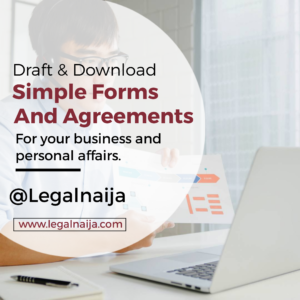
Global warming is a real problem threatening not only man’s existence on earth, but also the existence of plants and animals. Carbon pricing is an ingenious method which helps to cut down human activities that have led to the emission of and enhanced concentration of GHG in the atmosphere. By reducing emission of GHG, concentration of GHG in the atmosphere will be reduced.
As concentration in the atmosphere of excess GHG has been identified as the major reason for global warming[19], a policy such as Carbon Pricing which drives down GHG emission is very instrumental in climate actions. While it has been argued that global warming cannot be stopped even in the next several decades, we can however limit future warming to well below 2 degrees Celsius as envisaged by the Paris Agreement[20].
To achieve the above, all hands must be on deck and intentional policies, such as carbon pricing, amongst other policies, must be effectively implemented in ensuring that GHG emission is drastically reduced, thereby limiting future warming.
REFERENCES
Amanda Macmillan, Jeff Turrentine, “Global Warming 101” (April 7, 2021), Natural Resources Defense Council (blog), online: https://www.nrdc.org/stories/global-warming-101#warming
Anderson, B., Di Maria, C. “Abatement and Allocation in the Pilot Phase of the EU ETS”, Environ Resource Econ 48, 83-13 (2011). https://doi.org/10.1007/s10640-010-9399-9.
Australian Government, Department of Agriculture, Water and Environment., “Greenhouse effect”, online: https://www.environment.gov.au/climate-change/climate-science-data/climate-science/greenhouse-effect
Murray and N. Rivers, “British Columbia’s Revenue Neutral Carbon Tax: A Review of the latest Grand Experiment in Environmental Policy” (2015) NI WP 15-04. Durham, NC: Duke University. http://nicholasinstitute.duke.edu/publications.
British Columbia, climate action legislation (blog), online: https://www2.gov.bc.ca/gov/content/environment/climate-change/planning-and-action/legislation
Conference of the Parties, Adoption of the Paris Agreement, December 12, 2015, U.N. Doc. FCCC/CP/2015/L.9/Rev/1 (Dec. 12, 2015).
Eden. A, Unger. C, Acworth. W, Wikening. K, Haug. C, “Benefits of Emissions Trading: Taking stock of Emissions Trading Systems Worldwide”, International Carbon Action Partnership, (Updated: August, 2018)
Ellerman, A.D., Buchner, B.K. “Over-Allocation or abatement? A preliminary Analysis of the EU ETS Based on the 2005-06 Emissions Data”, Environ Resource Econ 41, 267-287 (2008). https://doi.org/10.1007/s10640-008-9191-2.
European Commission, Climate Action Directorate, “Causes of Climate Change”, online: https://ec.europa.eu/clima/change/causes_en
International Carbon Action Partnership, “Emissions Trading Worldwide, International Carbon Action Partnership (ICAP) Status Report 2015”
Johnson. S., Ydstedt. A, “ Looking Back on 30 Years of Carbon Taxes in Sweden”, Tax Foundation (blog), online: https://taxfoundation.org/sweden-carbon-tax-revenue-greenhouse-gas-emissions/
Mann, Micheal .E. “Greenhouse gas” (19 March, 2019), Encyclopedia Bitannica, online: https://www.britannica.com/science/greenhouse-gas
National Aeronautics and Space Administration, “Overview: Weather, Global Warming and Climate Change” online: https://climate.nasa.gov/resources/global-warming-vs-climate-change/
Stewart Elgie, “British Columbia’s carbon tax shift: An environmental and economic success” (10 September, 2014), World Bank Blogs (blog), online: https://blogs.worldbank.org/climatechange/british-columbia-s-carbon-tax-shift-environmental-and-economic-success
United States Environmental Protection Agency, “Overview of Greenhouse gases”, online: https://www.epa.gov/ghgemissions/overview-greenhouse-gases
World Bank Group, “What is Carbon Pricing”, The World Bank ((blog), online: https://www.worldbank.org/en/programs/pricing-carbon
Youmatter, “Carbon Pricing and Carbon Credits: Definition, Examples and History”, (21 February, 2020), online: https://youmatter.world/en/definition/definitions-carbon-price-carbon-credit/
[1] Amanda Macmillan, Jeff Turrentine, “Global Warming 101” (April 7, 2021), Natural Resources Defense Council (blog), online: https://www.nrdc.org/stories/global-warming-101#warming
[2] National Aeronautics and Space Administration, “Overview: Weather, Global Warming and Climate Change” online: https://climate.nasa.gov/resources/global-warming-vs-climate-change/
[3] Mann, Micheal .E. “Greenhouse gas” (19 March, 2019), Encyclopedia Bitannica, online: https://www.britannica.com/science/greenhouse-gas
[4] United States Environmental Protection Agency, “Overview of Greenhouse gases”, online: https://www.epa.gov/ghgemissions/overview-greenhouse-gases
[5] Australian Government, Department of Agriculture, Water and Environment., “Greenhouse effect”, online: https://www.environment.gov.au/climate-change/climate-science-data/climate-science/greenhouse-effect
[6] European Commission, Climate Action Directorate, “Causes of Climate Change”, online: https://ec.europa.eu/clima/change/causes_en
[7] World Bank Group, “What is Carbon Pricing”, The World Bank ((blog),online: https://carbonpricingdashboard.worldbank.org/what-carbon-pricing#:~:text=Carbon%20pricing%20is%20an%20instrument,to%20their%20sources%20through%20a
[8] Youmatter, “Carbon Pricing and Carbon Credits: Definition, Examples and History”, (21 February, 2020), online: https://youmatter.world/en/definition/definitions-carbon-price-carbon-credit/
[9] World Bank Group, “What is Carbon Pricing”, The World Bank ((blog), online: https://www.worldbank.org/en/programs/pricing-carbon
[10] International Carbon Action Partnership, “Emissions Trading Worldwide, International Carbon Action Partnership (ICAP) Status Report 2015”
[11] Eden. A, Unger. C, Acworth. W, Wikening. K, Haug. C, “Benefits of Emissions Trading: Taking stock of Emissions Trading Systems Worldwide”, International Carbon Action Partnership, (Updated: August, 2018)
[12] Ellerman, A.D., Buchner, B.K. “Over-Allocation or abatement? A preliminary Analysis of the EU ETS Based on the 2005-06 Emissions Data”, Environ Resource Econ 41, 267-287 (2008). https://doi.org/10.1007/s10640-008-9191-2.
[13] Anderson, B., Di Maria, C. “Abatement and Allocation in the Pilot Phase of the EU ETS”, Environ Resource Econ 48, 83-13 (2011). https://doi.org/10.1007/s10640-010-9399-9.
[14] World Bank Group, “Pricing carbon”, online: https://www.worldbank.org/en/programs/pricing-carbon
[15] Johnson. S., Ydstedt. A, “ Looking Back on 30 Years of Carbon Taxes in Sweden”, Tax Foundation (blog), online: https://taxfoundation.org/sweden-carbon-tax-revenue-greenhouse-gas-emissions/
[16] British Columbia, climate action legislation (blog), online: https://www2.gov.bc.ca/gov/content/environment/climate-change/planning-and-action/legislation
[17] Stewart Elgie, “British Columbia’s carbon tax shift: An environmental and economic success” (10 September, 2014), World Bank Blogs (blog), online: https://blogs.worldbank.org/climatechange/british-columbia-s-carbon-tax-shift-environmental-and-economic-success
[18] B. Murray and N. Rivers, “British Columbia’s Revenue Neutral Carbon Tax: A Review of the latest Grand Experiment in Environmental Policy” (2015) NI WP 15-04. Durham, NC: Duke University. http://nicholasinstitute.duke.edu/publications.
[19] EU, “Causes of Climate Change”, online: https://ec.europa.eu/clima/change/causes_en
[20] Conference of the Parties, Adoption of the Paris Agreement, December 12, 2015, U.N. Doc. FCCC/CP/2015/L.9/Rev/1 (Dec. 12, 2015).

Chinedu Uchenna is a Lagos based Lawyer and an Associate with Millhouse Legal Advisory. He is an environmental and Corporate Commercial law enthusiast. You can reach him on LinkedIn via:

by Legalnaija | Sep 20, 2021 | Uncategorized

Legalnaija.com helps support your business by providing you with simple forms and agreement templates you can customise and download from the ease of your devices.
Some of the document templates available include;
A. Non – Disclosure Agreement
B. Affidavits
C. Loan Agreement
D. Guarantors Forms, and
E. Loan Guaranty Agreement
To use any of the templates, follow these simple steps.
1. Log on to Legalnaija.com
2. Select “Draft An Agreement” from the menu list.
3. Choose any of the templates you need.
4. Fill out the questions
5. Make payment, and
6. Receive your document in Microsoft Word version via email.
We look forward to helping your business thrive and be successful.
@Legalnaija
www.legalnaija.com
by Legalnaija | Sep 14, 2021 | Uncategorized
 Question of the Week
Question of the Week
Dear IP ABC, I am Avesi Tersoo CEO of VESISOO Nigeria Limited. Two years ago I made a new industrial design for a laboratory test tube called Tersoo Tube. Tersoo Tubes has a new 3-dimensional form that makes it unique in shape, giving it aesthetic quality. Apart from aesthetics, the new shape enhances the functionalities of the test tube. To market Tersoo Test Tubes, I targeted research & development (R&D) institutions, hospitals, and schools. We neither publicized the creation of the design nor sold it. Instead, we licensed it to Dan Yel Ltd for one year for N10 million. Under the license, Dan Yel Ltd sold the product to the public as Tersoo Tubes. This was a year ago.
Months after the licensing agreement elapsed without renewal by Dan Yel Tubes, I discovered a new but identically designed test tube in the market called Dan Tubes. It is owned by Dan Yel Ltd. I reached out to the CEO of Dan Yel Ltd, demanding that they take the product out of the market. He disagreed, claiming that having failed to register the design as an industrial design, I no longer have any rights to the design. Do I have to register my design in order for it to be protected?
Answer
Dear Avesi Tersoo, the answer is YES, you must register your new design in Nigeria as an industrial design to enable you enjoy legal protection. This legal protection gives you exclusive right to your design. Under section 13(1) of the Patents and Designs Act, a design to be registered as an industrial design is presumed to be new at the time of the application for registration except you have made the design available to the public.
Having failed to register your Tersoo Test Tubes design and the design has been made available to the public following your licensing agreement with Dan Yel Ltd, you are not legally entitled to neither protection nor exclusivity.
But this does not completely make you helpless. Since you had a licensing agreement with Dan Yel Ltd and the company failed to renew its license, you can sue Dan Yel Ltd for breach of contract. The provisions of your licensing agreement will determine the extent of legal protection your company would enjoy based on contractual rights. Nothing more.

If Tersoo Test Tubes had not been made available to the public, it is registrable as an industrial design since it is a design with a 3-dimensional form that serves both aesthetic and technical use.
An industrial design is any combination of lines or colours or both, and any 3-dimensional form, if: (i) the creator intended that the design be used as a model or pattern to be multiplied by industrial process; (ii) the design is not intended solely to obtain a technical result.
Tersoo Test Tubes was designed in a unique shape to achieve not solely a technical result but achieve an aesthetic quality as well. This makes it eligible for industrial-design protection under Nigeria’s Patents and Designs Act.
By failing to register the design, it is now effectively in the public domain. Generally, anyone can come up with the same design anytime, anywhere.
If the creator was unaware of the public availability of the design, the design would still have been considered new in favour of the creator.
Under section 13(1) of the Act, if an industrial design had been made available to the public anywhere and at anytime by means of description, use, or in any other way, this defeats the presumption of newness.
But if the creator could not have known that the design has been made available to the public, the design would still qualify as new. To qualify, the creator is required to satisfy the Registrar that he had no knowledge of such unauthorized availability to the public (section 13{2}). Also, if an industrial design has only been exhibited in an official or officially recognized exhibition within 6 months before application for registration, it shall not be deemed to have been made available to the public (section 13{2}).
In your case, the two exceptions above do not apply. This is because by virtue of your licensing agreement with Dan Yel Tubes over a year ago, you authorized availability of the design to the public. For this reason, your recent discovery of Dan Tubes in the market is immaterial as far as design rights are concerned.
What about the licensing agreement you had with Dan Yel Ltd?
A licensing agreement is a legal written agreement between a licensor who is the owner of the work in question and the licensee who seeks the licensor’s permission to use, sell or make copies of the subject matter of the agreement.
Section 23(1)(a) of the Patents and Designs Act requires that a design owner may by a written contract signed by the parties grant a license to exploit the relevant design. Paragraph (b) then gives the licensor all the statutory rights of the design owner anywhere in Nigeria, subject to any restrictions in the licensing contract. Also, section 23(2)(a) requires that the license must be registered with the Trademarks, Patents, and Designs Registry otherwise it shall have no effect against third parties.
Applying the requirements above to your case, your licensing agreement with Dan Yel Ltd does not enjoy protection under the Act. This is because of 2 reasons: (1) You are not a ‘design owner’ under the Act since you have failed to register the design; and (2) you have not registered your licensing agreement with the Registry. (Even if you wanted to, the licensing agreement is not qualified for registration as long as the related design remains unregistered.) This is a classic case where Lord Denning’s words in the celebrated case of Mcfoy v. UAC apply when the law Lord (of blessed memory) said: “You cannot not put something upon nothing and expect it to stand”. Apt.
Therefore, you are not entitled to protection under the Act. This leaves you at the sole mercy of your licensing agreement as a private contract between you and Dan Yel Ltd.
Can you sue Dan Yel Ltd for selling your new-shape, test-tube product without your permission after your licensing agreement elapsed?
The Patents and Designs Act does not invalidate or make illegal design-rights licensing agreements that have not been registered with the Registry. What it does is limit the bindingness of unregistered licensing agreements regarding registered designs to parties in the contract only. Until registered, it does not bind third parties.
Yours is an unregistered licensing agreement for an unregistered design. The Act is silent regarding this. It renders you helpless under the Act. Effectively, not only is ownership of your design a mere allegation but also your licensing-agreement document is mere paper. Both design and document are unrecognized under the Act. Consequently, you are not entitled to any statutory relief by way of accounts of profits, damages, injunction, or otherwise, as guaranteed under section 25 of the Act.
Therefore, your remedy against Dan Yel Ltd’s action is in common law, not under the Act. You may consider suing the company for breach of contract, not design-rights infringement.
To learn more about all your legal options against future licensees and to best protect your business’s intangible assets, consult an IP lawyer or law firm.
IP ABC
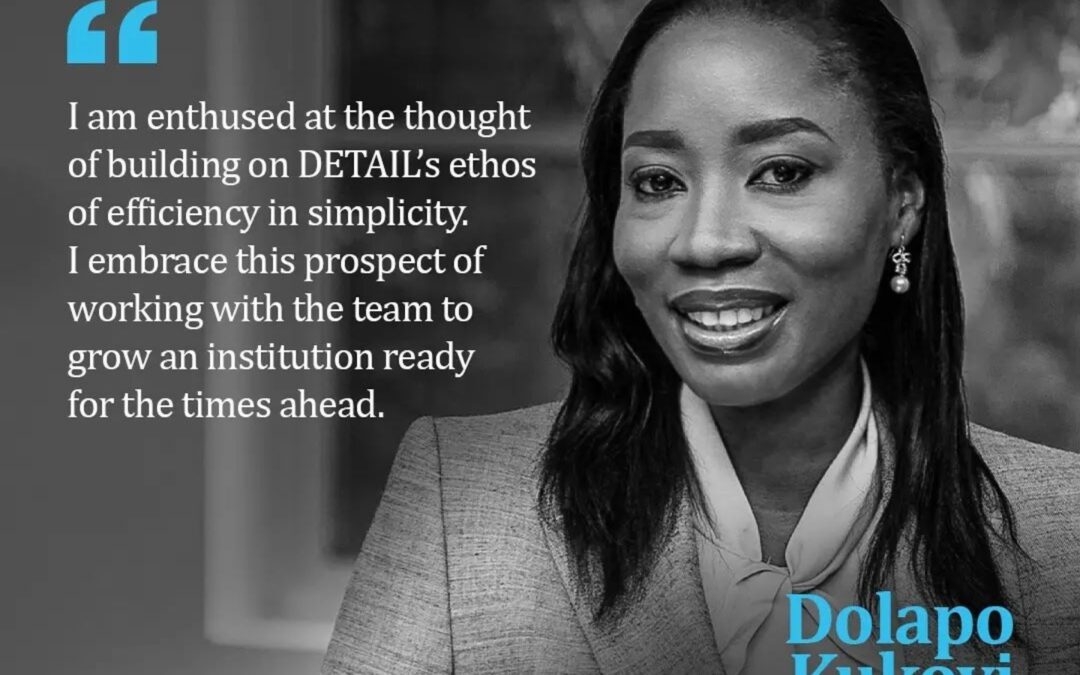
by Legalnaija | Sep 13, 2021 | Uncategorized

Interview With Managing Partner Of Detail Solicitors | Dolapo Kukoyi
1. In a society plagued with gender bias and discrimination in the workplace with particular reference to the legal profession, you’ve risen to become Managing Partner of one of Nigeria’s foremost (if not only) non-courtroom practice. How did you achieve this feat?
I would say that I have been blessed to be in the right environment with the right support that has brought me this far. DETAIL is designed to be a mentoring environment that enables every lawyer be the best that they can be irrespective of their gender. My Lead Partner (my mentor) encouraged me every step of the way (even when I was kicking and screaming). DETAIL as a firm understands that women come with their unique “blessings” that may make working in a profession and an environment like ours quite challenging, but we ensure that they have all the support that they need to thrive.
Certainly, I cannot discount all the support that I had from my family; my husband who has been very supportive of my career, my parents (who were very supportive with helping with my children in the early years) and my children as well.
To sum it up I would say by the grace of God I’ve been fortunate and blessed.
2. Briefly describe the path to partnership in a top tier commercial law firm in Nigeria?
Our Path to partnership at DETAIL is transparent and predictable. One of our core values is organic growth and everyone employed at DETAIL is a potential partner at the firm. It’s the reason why we have a unique recruitment process. Once you get into DETAIL you are able to predict your path to partnership as long as you meet the KPIs for each role.
3. For the benefit of the younger generation of lawyers, could you please briefly share about your journey to the top?
Where do I start, long story…. I started as a solicitor at DETAIL 16 years ago at the time when Ayuli Jemide our Lead Partner had just moved to Lagos and the firm was transitioning from being a full-service firm based in Port Harcourt to a commercial solicitors’ firm with exclusive focus on non-courtroom work in Lagos. I have been fortunate to have been part of the process of building the firm and witnessing what was at the time an ambitious business a plan coming to life. I have also been privileged to witness many of the firm’s milestones.
My journey is one of growth step by step, learning line upon line into ownership. I became a Partner in 2012 and 3 years ago, I started my incubation period as Managing Partner. It’s been a learning journey, building relationships, taking opportunities, standing courageously and breasting fierce winds. Albeit it’s been a very interesting, impactful and rewarding journey. All glory to God!
4. The global spread of COVID-19 has continued to impact all sectors, industries and markets. How in your opinion, have legal businesses been impacted by the pandemic?
Legal businesses have been impacted by the pandemic because our clients have also been impacted but its interesting to note that the legal business in Nigeria and I would say across the world too actually started to have challenges at least two-three years before the pandemic. Specifically speaking for Nigeria, remember that we had a recession prior to the pandemic and we were already seeing in Nigeria a legal market where there was fierce competition, under pricing, increasingly sophisticated clients who wanted more work for less money. A number of commercial firms were already considering their options on how they could innovate and get a bigger pieces of the pie in terms of legal work. From a national perspective we have also seen an increase in insecurity and issues around poverty and crime that has impacted on business and movement of goods and services.
Coming back to the pandemic I would say that it has also has its bright sides; one being the value and utility of technology in the legal business, communicating with clients and the delivery of legal services is unprecedented. In addition, on the business side a lot of clients who value legal services have had to lean heavily on law firms to navigate them through restructuring they require in these times. It’s been challenging but we are grateful at DETAIL to have been able to support our clients as we keep growing, evolving, and innovating to meet their needs.
5. It’s over a year and a pandemic era and continue to deal with several fallouts and impact on legal businesses in this climate. As Managing partner, how are you moving to support the team at DETAIL to cushion the effects of this new reality?
The only constant thing in life as we say at DETAIL is change. The times ahead call for constant introspection, innovation in our business and constantly providing value added client support. It’s also a time to proactively understand all that is going on in our macro environment and assist our clients and stakeholders in responding to the effects of the environment on their businesses.
For us as a team to internally be able to deal with all of the changes stated above and support our business we are constantly building capacity, encouraging and incentivising innovation, supporting each other mentally, emotionally and physically in these times. It’s a time like no other for empathy and inclusiveness and as a leadership a time to constantly engage and listen to the younger generation.
6. Regardless of outcomes, it is believed that situations such as the pandemic we’re in today, could present opportunities for positive change. What sort of the opportunity are you optimistic about as we emerge from this?
Like the proverbial saying under every cloud there is a silver lining and it always depends on us having the right perspective, I think that the pandemic presents an opportunity for us to push boundaries and create disruptions. For instance, no one would have thought that tele/ remote working or schooling would become a way of life with people remote working across countries and continents and physical boundaries becoming smaller. Its also an opportunity to leverage technology in different economic sectors andalso find avenues to make sustainable impact on our environment and communities that we live and do business in.
The pandemic has also afforded the opportunities for businesses to reassess their business models and how they reach their clients, customers and stakeholders. It has also birthed a lot of business ideas. I was reading an article in Forbes the other day and it reports that in 2020 more than 4.3 million people registered new business applications (US Census Bureau) this is more than 25% increase in 2019 numbers and a stark difference compared to the 2008 credit crisis which only saw an 8% drop in company applications. By February 2021 the registration of new business has increased by another 40%. Implication being that people are seeing opportunities for new ventures and technology is reducing the barriers to entry for businesses. In Nigeria we are seeing a lot of funding coming into the Fintech industry and a lot of players becoming unicorns. A report by the Fintech Association of Nigeria and Ernst and Young estimates that the Fintech Sector raised about $439 million USD in 2020 alone which represents 20% of capital raised by all African Start tech startups.
The pandemic has also presented the opportunity for us to also reassess what is most important to us as individuals in terms of health and mental wellbeing, family and life priorities generally and how we want to leave a legacy for the future.
7. As a business law expert, how do you think Nigeria’s administration of justice system affects local businesses and foreign investments today and how in your opinion can we get the best out of the system?
Administration of justice is critical for local businesses and foreign investments because it’s meant to be a basis for confidence that if and when transactions run into disputes or things go wrong the disputes can be resolved fairly and transparently within reasonable time. However, where you have a failing justice system or one that doesn’t provide for the confidence required, you find people looking for alternatives such as provisions for foreign dispute resolution or in some extreme cases you will find clients who would rather not do any business at all.
In terms of how we can get the best out of the system, I would say we at DETAIL have chosen to stay proactive such that in structuring client transactions, projects and contractual arrangements, we are able to spot potential disputes and risks ahead, advice on risk mitigation and keep our clients from getting into disputes.
8. On a final note, where do you see legal practice in Nigeria in another 10 years?
The Nigerian legal market is one of the most sophisticated and competitive markets across Africa maybe apart from South Africa and a few other countries. I think that we will see commercial law practice evolve with the use of technology and artificial intelligence. I still think that having specialist practice areas will still be important as clients get more sophisticated and deal with sundry legal issues internally or outsource at least cost. We are likely to see law firms evolve and innovate as client’s needs and requirements also evolve.
We are also likely to see more collaborations and mergers with international law firms as long as Nigeria remains an investment destination of choice. A lot of the growth in legal practice at least on the commercial side will be determined on what progress is made as a nation in terms of leadership, economic development, political structure, administration of and enabling business environment to mention a few. I would say that lawyers in Nigeria have a vested interest in ensuring that Nigeria thrives and succeeds.
ABOUT THE AUTHOR
Dolapo Kukoyi is the Managing Partner at Detail Commercial Solicitors and leads the firm’s Energy, Infrastructure & Power Practice. She is one of the leading lawyers in Nigeria’s Power sector with extensive experience advising clients in the private sector, government agencies and regulators on a wide range of complex transactions. “She stands out as perhaps the most knowledgeable lawyer in the country on the Nigerian power industry.” Chambers & Partners, global commentary 2019.
Dolapo combines her strong legal background and industry knowledge to add value to each transaction. Her attention to the intricacies of every brief sets her apart as a pillar of support to clients.
With over 15 years’ experience, Dolapo is an avid speaker and thought leader, passionate about increasing energy access in Nigeria and across Africa by leveraging private finance with the use of viable business and project models.
Dolapo enjoys listening to music, singing, and playing golf.

by Legalnaija | Sep 11, 2021 | Uncategorized
This article examined the concept of corporate personality and identified the different approaches adopted in the application of the principle in India, Singapore, America, England, Ghana and Nigeria. It is apt and interesting.
SINGAPORE AND INDIA
In Singapore the law is clear on the concept of corporate personality. Under the Singapore Companies Act of 2006, it provides in S. 23 (1) that, ‘a company has full capacity to carry on or undertake any business or activity, do any act or enter into any transaction’. The Singapore courts have always been slow to disregard a company’s separate legal identity. In the case of Goh Chan Peng v Beyonics Technology Ltd, the Singapore Court of Appeal reiterated that companies within the same corporate group would be treated as separate legal personalities rather than a single economic entity. See the 2018 case of Jhaveri v Salgaocar, where the High Court in Singapore rejected the request to displace company’s separate legal personality.
In India the concept of distinct personality of a corporation has been categorized into two, namely, (i) corporation aggregate and (ii) corporation sole.
Corporation Aggregate: Here a company is an association of human beings united for the purpose of forwarding their certain interest. A limited Company is the example. Such a company is formed by a number of persons who as shareholders of the company contribute or promise to contribute to the capital of the company for the furtherance of a common object.
Corporation Sole: this means that a company is an incorporated series of successive persons. It consists of a single person who is personified and regarded by law as a legal person. In consequence, the death of a corporation sole does not adversely affect the interests of the public in general.
The Companies Act of India 2013 recognized the concept of a separate legal personality even in the case of a one person company (See Ss. 3(10) 9 of the Act). The Supreme Court of India in the case of Electronics Corporation of India Ltd. v. Secretary, Revenue Department, stated that a clear distinction must be drawn between a company and its shareholders, even though that shareholder may be only one member. In the eyes of the law, a company registered under the Companies Act is a distinct legal entity other than the legal entity or entities that hold its shares.
ENGLAND
The principle of corporate separate originated from England. One of the earlier cases where the concept of corporate personality was applied is the case of Farrar v. Farrar, where the Court held that, ‘a sale by a person to a corporation of which he is a member is not, either in form or in substance, a sale by a person to himself’. This was followed by the decision in Salomon v. Salomon. Where it was state that, ‘when the memorandum is duly signed, the subscribers are body corporate, capable forthwith of exercising all the functions of an incorporated company..
The principle of separate legal personality is contained in the England Companies Act 2006. Section 16 of the Companies Act provides that, ‘a body corporate is capable of exercising all the functions of an incorporated company and has its own existence as an entity’.
UNITED STATES OF AMERICA
The principle of separate corporate personality in the USA is categorized into theories. The theories include; the fiction theory, association theory, the realism theory, etc.
The Realism Theory
This theory postulates that, a corporation is an organic social reality with existence independent of, and constituting something more than its changing shareholders. Thus, corporation is simultaneously, a legal fiction, a contractual network and a real organization.
The Association Theory
This theory states that a corporation is an association of individuals contracting with each other in organizing the corporation with its core attribute as an artificial person, supplemented by attribution of the constitutional rights of its shareholders. This principle was recognized in the RAILROAD CASE,
The Fiction Theory
This theory states that corporation is an artificial being, invisible, intangible and existing only in the contemplation of the law. Being the mere creation of the law, it possesses only those properties which the charter of its creation confers upon it, either expressly or as incidental to its existence. This theory was explained in the case of Trustees of Dartmouth College v. Woodward.
GHANA AND NIGERIA
Ghana recognizes the principle that upon incorporation a company is distinct from the members that formed it. This position is stated in the Companies Act of Ghana 2019 and affirmed by Courts in Ghana. Under the Companies Act of Ghana, S. 9 of the Act provides that; ‘From the date of incorporation mentioned in the certificate of incorporation, such subscribers to the memorandum and all other persons, as may, from time to time, become members of the company, shall be a body corporate…’ In the case of Hamelrijk V. Shenakram, the Ghana Court of Appeal rejected the argument that the director of a company is personally liable for the debt of the company. See also the Ghana Supreme Court decision in MARKOR V. KUMA.
In Nigeria, the Position is similar to that of Ghana. The English legal system has a substantial influence in the Nigerian legal system. Under the Nigerian law, a company acquires distinct legal personal from the moment of incorporation. (See S. 42 of the Nigerian Companies and Allied Matters Act 2020). The Courts in Nigeria have recognized and applied the concept of corporate personality of a company in number of cases. In Marina Nominees Ltd. V. F.B.I.R, The Supreme Court held that, ‘an incorporated company is a separate legal entity which must fulfill its own obligations under the law’. See also, Dunlop Nigerian Industries Limited v. Forward Nigerian Enterprises Limited.
Conclusively, it is clear from the above that both the court and statutes in Ghana, Nigeria, Singapore, India, England and America recognized the concept of separate corporate personality. However, the principle of corporate personality is not absolute. Either under the Statute or Common Law a veil of incorporation may be lifted where there is fraud in order to identify the individuals behind the fraudulent dealings. Thus, the directors and shareholders can be prosecuted where they hide under a company to commit crimes or carryout illegal transactions.
 OKPI, BERNARD ADAAFU ESQ,
OKPI, BERNARD ADAAFU ESQ,
Affiliate: OBA ATTORNEYS LP
Email: okpibernardadaafu@nigerianbar.ng
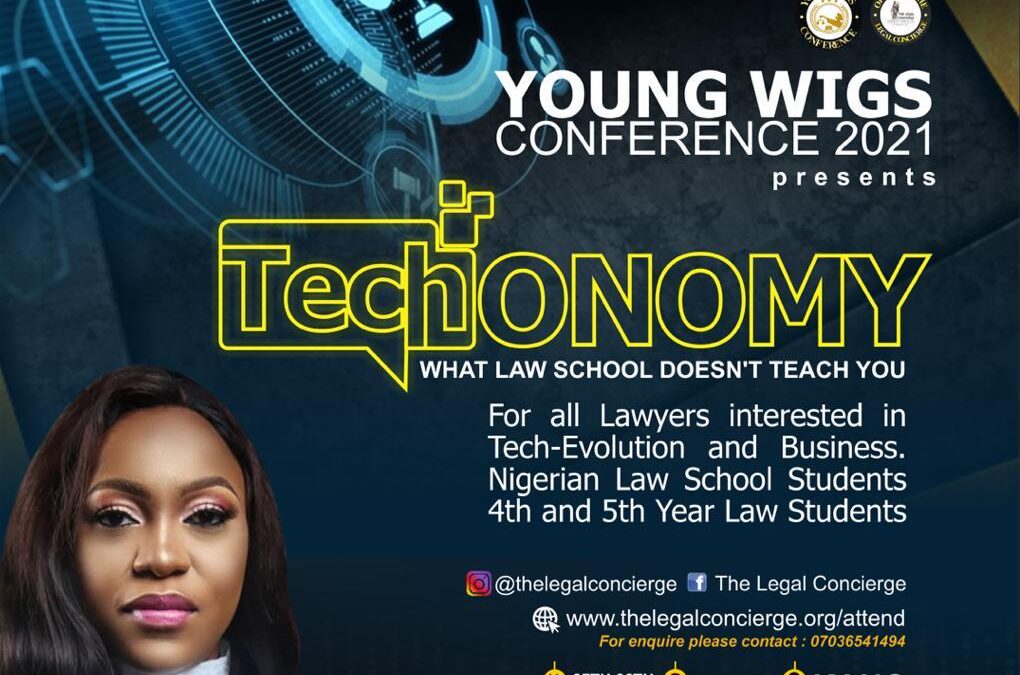
by Legalnaija | Sep 7, 2021 | Uncategorized
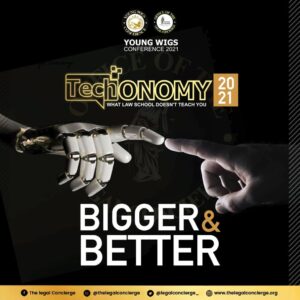
YOUNG WIGS CONFERENCE 2021 & YOUNG AFRICAN LAWYERS AND TECHNOLOGISTS (Y.A.L.T) LOCAL CONTENT ROUNDTABLE!
The Young Wigs Conference was birthed in the year 2015 by Inemesit Joy Dike Esq, a legal practitioner and admitted member of the Supreme Court of Nigeria and the New York Bar, United States of America. She is an alumnus of the University of Lagos, the Abuja Law school and she has designed the Young Wigs Conference as a platform to bridge the skills gap between young, upwardly mobile Lawyers and the realities of the practice of Law while encouraging innovation and creative skills for effective use of technology in today’s legal sphere.
This Conference is targeted at Lawyers and Law students who are at the bottom of the revenue pyramid. It has become a strong community whose annual highlight is the gathering of young lawyers, learning, sharing knowledge and helping one another.
THE 2021 CONFERENCE: TECHONOMY: WHAT LAW SCHOOL DOESN’T TEACH YOU
The theme “TECHONOMY” combines the word “Technology” and “Economy” .This reflects our ethos that technology is inextricably entwined with the economy of legal practice. This Conference is designed to foster multidisciplinary dialogue for the benefit of 4th and 5th Year Undergraduate law students and students at the Nigerian Law School, Young Lawyers who are between 1-7 Years of Call & Senior Members of the Bar who are interested in evolutions in Law.
Register at www.thelegalconcierge.org/attend
SCHEDULE OF EVENTS
On the 27th September, 2021 in Kano, the event kicks of with a serious of virtual workshops from 9am -2pm. Notable international speakers will be giving insights on various aspects of TECHONOMY.
Thereafter, the first Young African Lawyers and Technologists (Y.A.L.T) Local Content Roundtable is scheduled to hold. We would be discussing the African Continental Free Trade Agreement and the necessary steps to be taken by young lawyers and technologists. The objective of the Pan-African engagement includes:
• To institutionalize peer review mechanism on local content for law and technology, as a key development imperative for domestication and sustainable growth of Africa’s resources.
• To discuss practical steps to promote intra-African trade by African SMEs and startups through the leveraging of existing opportunities as well as future provisions of the agreement.
• Participants will work on strategic ideas to facilitate urgent engagement between the public and private sectors.
On the 28th September, 2021 ,the focal technical sessions of the Young Wigs Conference is scheduled to take place with outstanding industry leaders within the law, academia, tech industry and in business. Time is between 8am-2pm.
Kindly RSVP to +234 8033010052 and email info@thelegalconcierge.org for more information
Inemesit Dike MCIArb, A.C.I.S
Attorney, Supreme Court, Nigeria & State of New York, USA
Conveneralumnus of the University of Lagos, the Abuja Law school and she has designed the Young Wigs Conference as a platform to bridge the skills gap between young, upwardly mobile Lawyers and the realities of the practice of Law while encouraging innovation and creative skills for effective use of technology in today’s legal sphere.
This Conference is targeted at Lawyers and Law students who are at the bottom of the revenue pyramid. It has become a strong community whose annual highlight is the gathering of young lawyers, learning, sharing knowledge and helping one another.
THE 2021 CONFERENCE: TECHONOMY: WHAT LAW SCHOOL DOESN’T TEACH YOU
The theme “TECHONOMY” combines the word “Technology” and “Economy” .This reflects our ethos that technology is inextricably entwined with the economy of legal practice. This Conference is designed to foster multidisciplinary dialogue for the benefit of 4th and 5th Year Undergraduate law students and students at the Nigerian Law School, Young Lawyers who are between 1-7 Years of Call & Senior Members of the Bar who are interested in evolutions in Law.
Register at www.thelegalconcierge.org/attend
SCHEDULE OF EVENTS
On the 27th September, 2021 in Kano, the event kicks of with a serious of virtual workshops from 9am -2pm. Notable international speakers will be giving insights on various aspects of TECHONOMY.
Thereafter, the first Young African Lawyers and Technologists (Y.A.L.T) Local Content Roundtable is scheduled to hold. We would be discussing the African Continental Free Trade Agreement and the necessary steps to be taken by young lawyers and technologists. The objective of the Pan-African engagement includes:
• To institutionalize peer review mechanism on local content for law and technology, as a key development imperative for domestication and sustainable growth of Africa’s resources.
• To discuss practical steps to promote intra-African trade by African SMEs and startups through the leveraging of existing opportunities as well as future provisions of the agreement.
• Participants will work on strategic ideas to facilitate urgent engagement between the public and private sectors.
On the 28th September, 2021 ,the focal technical sessions of the Young Wigs Conference is scheduled to take place with outstanding industry leaders within the law, academia, tech industry and in business. Time is between 8am-2pm.
Kindly RSVP to +234 8033010052 and email info@thelegalconcierge.org for more information
Inemesit Dike MCIArb, A.C.I.S
Attorney, Supreme Court, Nigeria & State of New York, USA
Convener
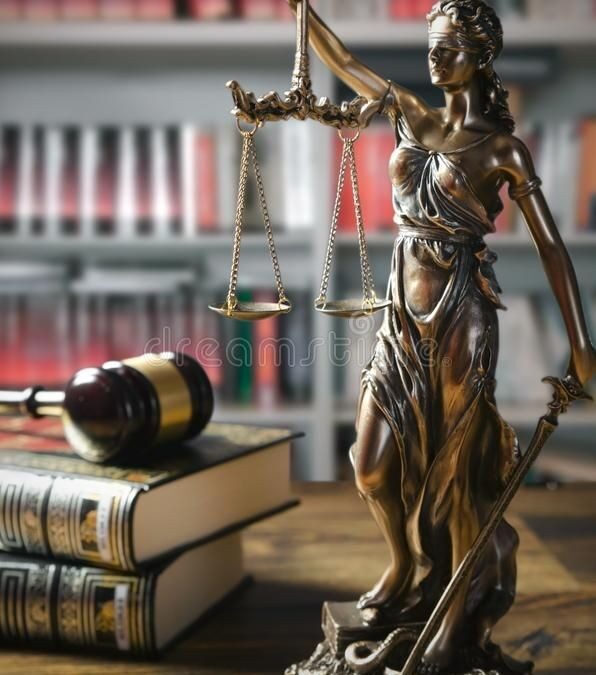
by Legalnaija | Sep 7, 2021 | Uncategorized
Law books are the lifeline for lawyers, law firms, law researchers and law students. Take a look at some of these best reads for lawyers, so you can learn the requisite information to help represent your client excellently and advance your skills as a lawyer. All books are available for local and international delivery on the Legalnaija online bookstore www.legalnaija.com/shop
A – Z Of Sports Law
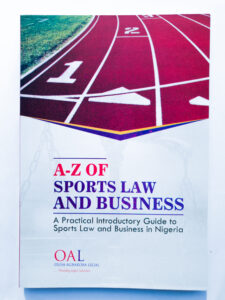
₦2500
The A to Z of Sports Law and Business is a comprehensive and bite-sized industry guide book for lawyers and non-lawyers to all the major hot topics you need to know in the sports industry.
Babalola’s Law Dictionary (2nd Edition)
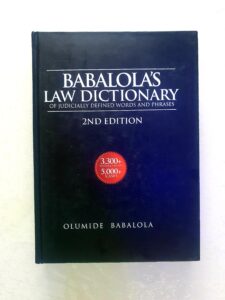
₦5000
Babalola’s Law Dictionary Of Judicially Defined Words And Phrases (2nd Edition) lists over 3300 definitions and cites over 5000 cases. The Dictionary remains a must have for every lawyer, law firm and law student.
Casebook On Data Protection
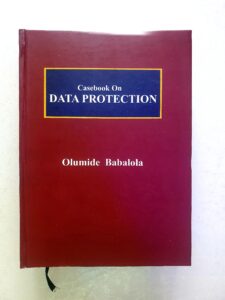
₦20000
The book is divided into fourteen chapters. After an introduction that traces the brief history of data protection in Nigeria, separate chapters are devoted to Definitions, Relationship with other rights; Principles of Data Protection; Exceptions and Derogation; Employment Data; Sensitive Data; Transfer of Data to a Foreign Country; Liability of Data Controllers; Data Subject’s Rights; Data Breach; Remedies; Data Property Rights; Supervisory Authority and Appendices that feature the Nigeria Data Protection Regulation and the NDPR Implementation Framework.
Casebook On Human Rights Litigation In Nigeria
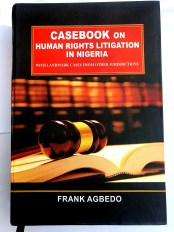
₦20000
Human rights litigation in Nigeria is the latest book on Human rights by Frank Agbedo, author of the popular law books, Rights of Suspects and Accused Persons and Human Rights Litigation in Nigeria.
This book focuses on a compilation of leading cases on all salient legal principles and issues affecting fundamental rights enforcement in Nigeria.
This book painstakingly addresses the predicament of lawyers and judges in accessing relevant cases of interest, by providing and updating the practitioners with a comprehensive collection of (both current and locus classicus) reported cases mainly from decisions of the Supreme Court and Court of Appeal, on all notable issues of law and procedure relating to human rights litigation in Nigeria.
Human Rights Litigation In Nigeria: Law, Practice And Procedure
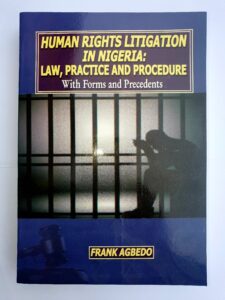
₦8000
This book is written by Mr. Frank Agbedo, one of Nigeria’s leading authors in human rights literature and jurisprudence.
Principal features of the book include but are not limited to the ABC of human rights litigation, an in depth analysis of the new FREP Rules 2009, A review of judicial attitude to enforcement of Fundamental Rights Cases, Prosecuting Appeals in Fundamental Rights Cases, The status of public interest litigation in Nigerian Courts, The Role of Amici Curae in human rights litigation, the justiciability or judicialisation of socio-economic rights in Nigerian Courts and the future of human rights litigation. The book also features a comprehensive package of practice forms and precedents relating to practical applications for enforcement of fundamental rights, as well as a comprehensive index of cases and relevant statutes.
Practice forms and precedents
The book is almost a ready answer to all issues and matters relating to preparation, initiation, filing and prosecution of fundamental right cases in Nigerian Courts. The book is comprehensive enough to cover the field of human right law, practice and procedure and which could be better described as a One-Stop-Shop in human rights litigation.
International Arbitration Law And Practice: The Practitioners Perspective
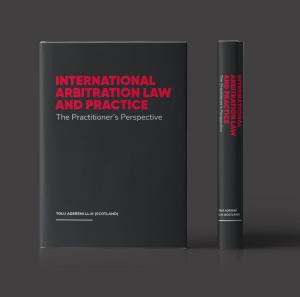
₦10000
Edited by: Tolu Aderemi
The Practitioners Perspective” is one book every arbitration practitioner or student should have.
The Book is a compendium of scholarly papers that focus on contemporary topics which will deepen the practice of arbitration; whether at a junior or mid-Senior level. This book is a valuable resource tool for Arbitration Practitioners and is a welcome contribution to the body of knowledge on the topic in Nigeria.
The book which is edited by Tolu Aderemi, Partner, Perchstone & Grays, is also a compilation of articles by seasoned international arbitration practitioners from both within and outside the Nigerian legal jurisdiction including very eminently qualified and senior Arbitration practitioners such as Kamal Shah (UK), Funke Adekoya SAN, Dr. Babatunde Ajibade, SAN, Adedoyin Rhodes-Vivour SAN, Hon. Justice Nnamdi Dimgba, Tunde Fagbohunlu SAN, Osaro Eghobamien SAN, BOLAJI AYORINDE SAN, FCArb., O.F.R., Bode Olanipekun, SAN, Tunde Busari, SAN, FCIS, FCIArb, @Ikponwosa Omigie (Company Secretary, NAPIMS), Prof Alero Akeredolu, Funmi Roberts and Prof Olawuyi.
This book is a valuable resource tool for Arbitration Practitioners and is a welcome contribution to the body of knowledge on the topic in Nigeria.
Social Media For Lawyers
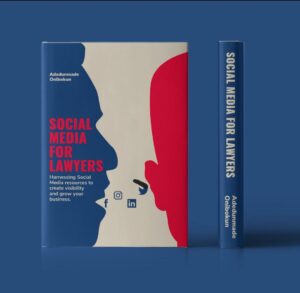
₦2500
This book helps lawyers, and law firms can harness social media resources to boost clientele, establish their reputations in niche practice areas and advance their legal careers.
Author- Adedunmade Onibokun
The Employment Law Handbook
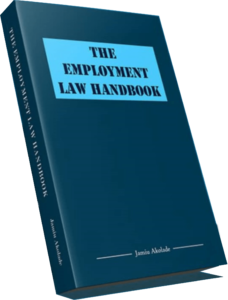
₦15000
The Employment Law Handbook is written to fill a gap identified in the nature of texts on Employment and Labour Law in Nigeria. While there are many well-researched books on the general principles of Labour and Employment Law, there is a dearth of quick reference materials for Human Resource Managers and Legal Practitioners who have to grapple with taking decisions and advising on workplace related issues on a daily basis. This need is accentuated by the rapid changes in this area of the Law in recent years.
This book provides answers to most of the frequently asked questions on Employment and Labour Law, contains a synopsis of all Employment and Labour Law related legislations as well as selection of precedents.
The Nigerian Electricity Market; Understanding The Transactional, Legal & Policy Issues
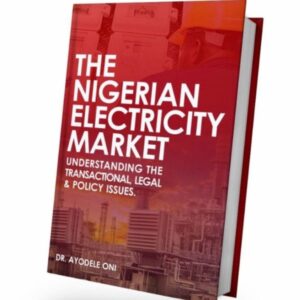
Order via Legalnaija.com/shop
₦35000
The book aims at giving industry participants all the necessary negotiating tools as they engage in the complexities within the power sector in Nigeria. The book discusses licenses, agreements, and regulations that operate within the power industry space.
Understanding Petroleum (Oil & Gas) Transactions and the Nigerian Market
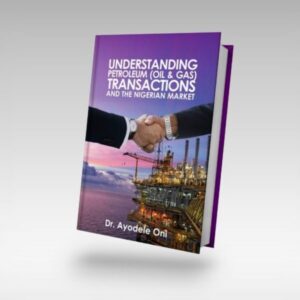
₦50000
There have been several policies in the Petroleum industry such as those related to local content and domestic gas supply obligations. This book provides a clear Insight about executing transactions, obtaining licenses and other complex issues industry participants encounter.
Visit the law shop now on www.legalnaija.com/shop
Or social media @Legalnaija
Or via Whatsapp/Text/Call on 09029755663
Legalnaija Team
The Nigerian Blawg
Legalnaija@gmail.com
www.legalnaija.com
09029755663











 Chinedu Uchenna is a Lagos based Lawyer and an Associate with Millhouse Legal Advisory. He is an environmental and Corporate Commercial law enthusiast. You can reach him on LinkedIn via:
Chinedu Uchenna is a Lagos based Lawyer and an Associate with Millhouse Legal Advisory. He is an environmental and Corporate Commercial law enthusiast. You can reach him on LinkedIn via:
 Question of the Week
Question of the Week 



 OKPI, BERNARD ADAAFU ESQ,
OKPI, BERNARD ADAAFU ESQ, 











